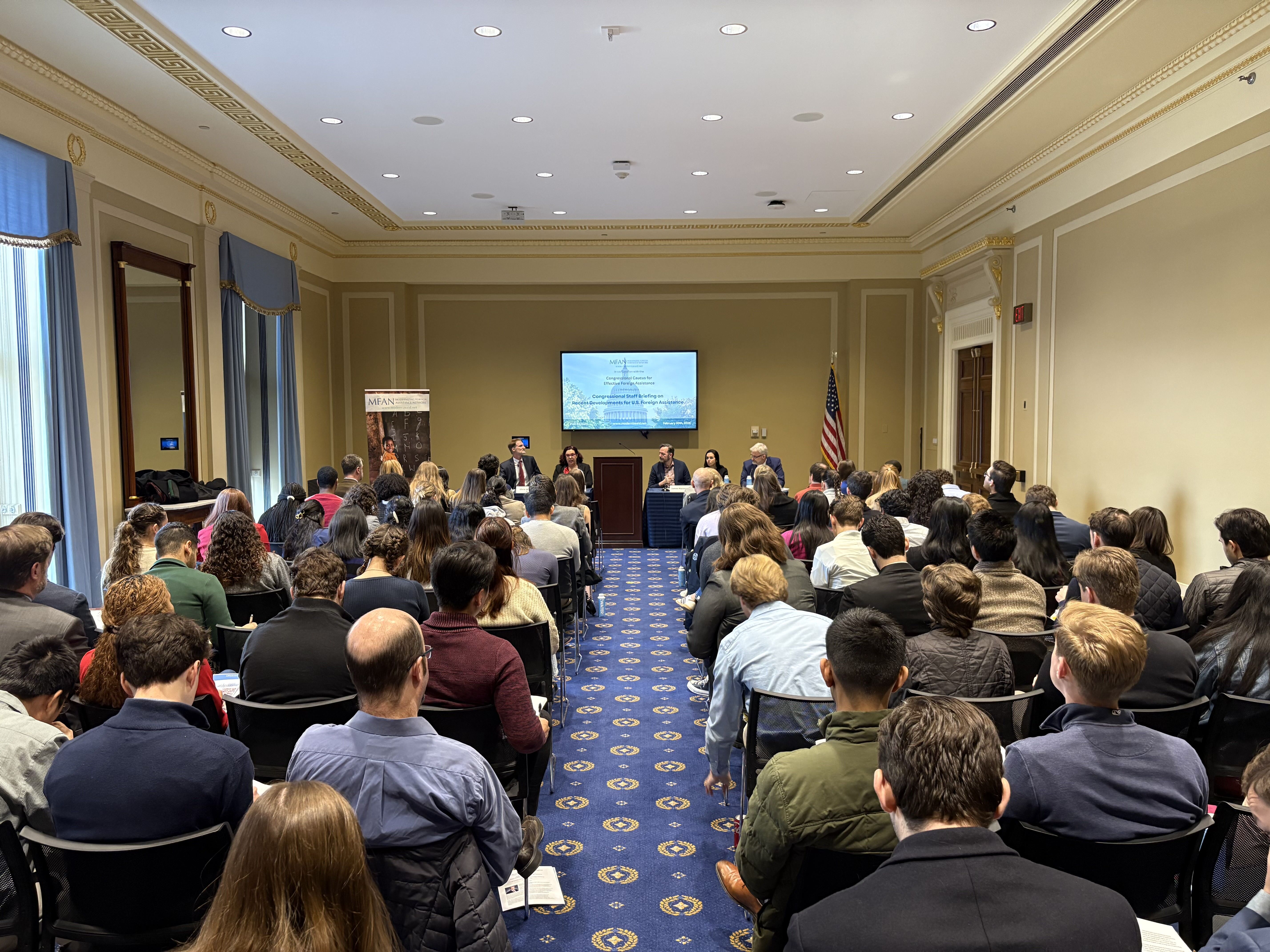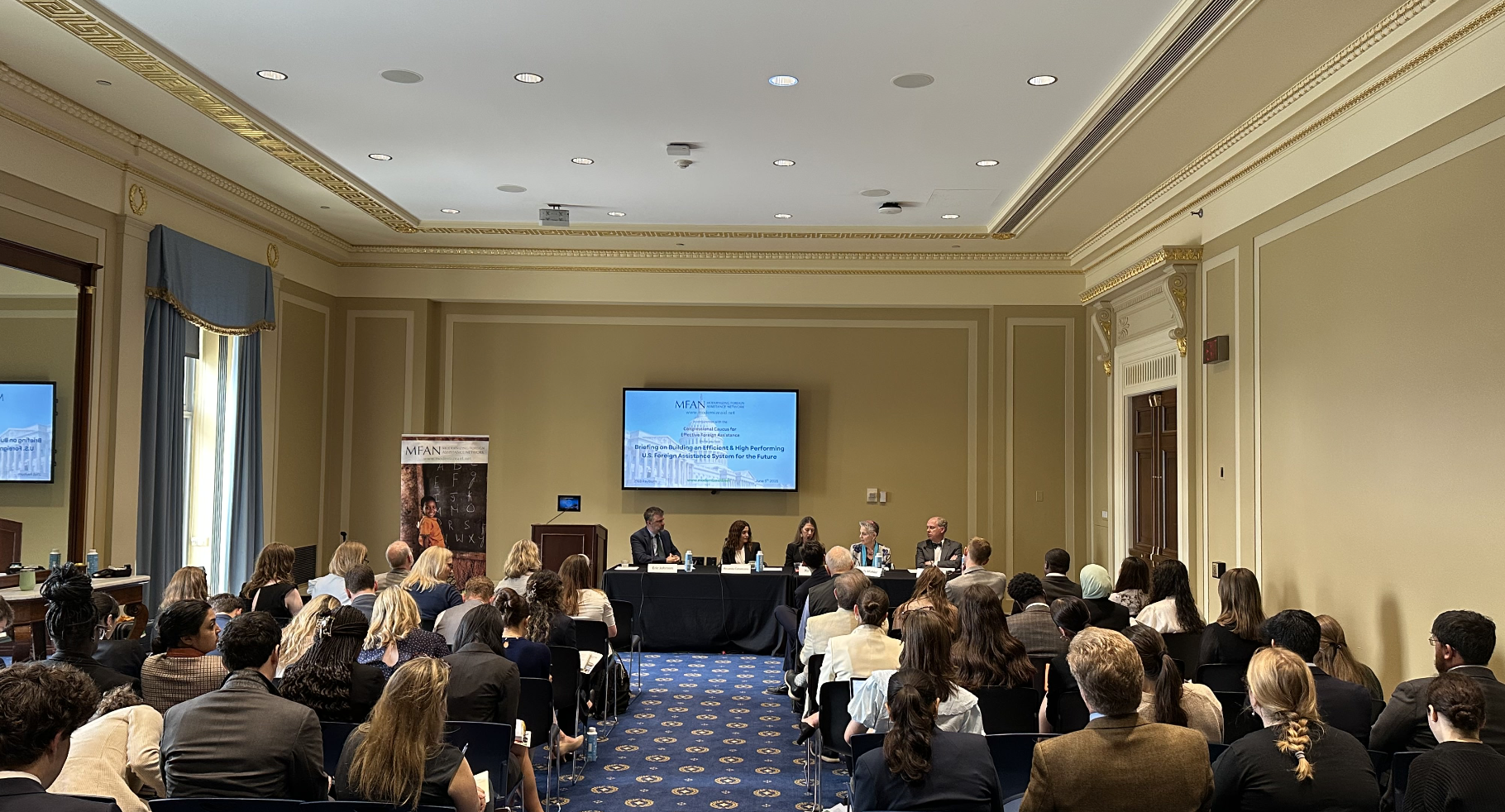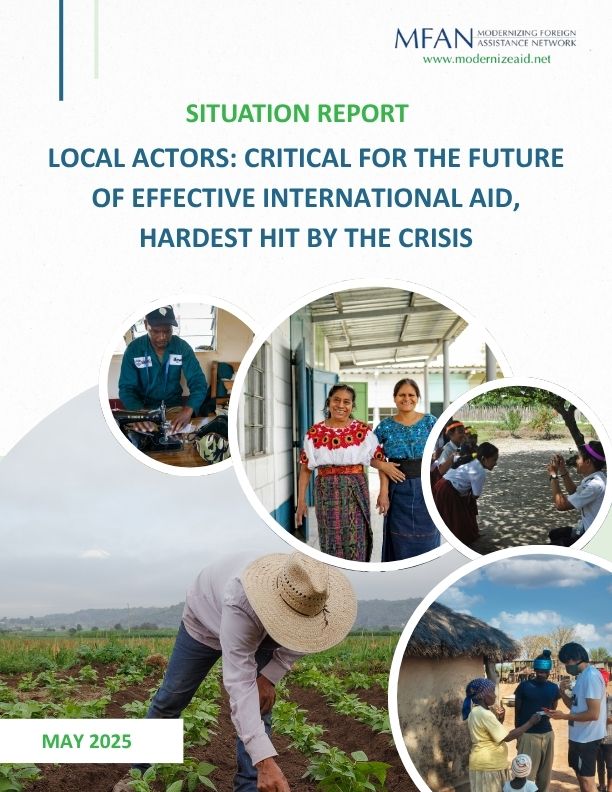July 8, 2025
Dear Friends of MFAN –
It’s hard to believe how vastly different the foreign affairs landscape looks now versus December when we sent out our last newsletter. The degree of disruption and outright destruction is devastating to so many of us in the international development community and to the communities around the world with whom many of us have partnered over the years.
For more than 15 years, MFAN has served as a trusted, bipartisan advocate for more effective and accountable foreign assistance. Now, in the face of rapid changes and constantly moving goalposts in Washington and beyond, MFAN is elevating our role as a critical thought leader and convener in the community and for policymakers.
As USAID closes its doors, the State Department reorganization and reauthorization of the U.S. International Development Finance Corporation moves forward, and funding is appropriated and (possibly) rescinded or impounded, MFAN is bringing stakeholders together to protect and help shape the future of U.S. foreign assistance.
With our members’ deep expertise on international development and humanitarian programming and effectiveness, MFAN is proud to have been the first in the community to release actionable policy recommendations earlier this year on the State-USAID reorg -- and we commit to continuing to take a leadership role throughout this turbulent period.
Education and advocacy on Capitol Hill have always been a top priority for MFAN -- and even more so now given the very challenging political environment. This year, we have hosted three very well-attended congressional staff briefings in conjunction with the bipartisan Caucus for Effective Foreign Assistance. We’re also speaking to the press regularly to help keep people informed on the latest developments in Washington and the key U.S. government agency functions needed for highly impactful international health and development programs. In recent weeks, MFAN has been featured or quoted in stories that appeared in a variety of press outlets, including CNN, NPR, CQ, Devex, Vox, and Foreign Policy.
Here is an overview of some notable MFAN activities from the first half of this year:
MFAN Responds to Changes in U.S. Foreign Aid and Fights to Protect MCC
As the foreign aid landscape has continued to shift since January, MFAN has been quick to publicly respond to new executive orders and policies, ensuring the voice of the community was heard on Capitol Hill and beyond. On February 3rd, we issued a statement urging the Administration to reverse course on the abolishment of USAID and encouraged Congress to take a more active role in this important conversation. On February 27th, we followed this message with a statement lamenting the decision to terminate 10,000 State Department and USAID contracts and grants (a number which has since increased) and advocated for a true foreign aid review and evaluation process. And on April 29th, we condemned the rumored closure of the Millennium Challenge Corporation, highlighting MCC’s proven track record of effectiveness and results and highlighting their history of forging critically important partnerships and alliances in pursuit of sustainable economic growth, trade, and security.
Keeping Capitol Hill Informed and Connected via a Series of Congressional Staff Briefings
In addition to MFAN’s ongoing meetings with House and Senate offices, we’ve convened three Congressional staff briefings (on February 20th, April 15th, and June 5th) about the changes being made to U.S. foreign assistance and putting forward alternative policy proposals. Nearly 100 Hill staffers attended the first two briefings. This outpouring of interest demonstrates the Hill’s appetite for up-to-date information from our members on the direct impact of current changes and their desire for pro-active, forward-looking policy recommendations from MFAN for the future of U.S. foreign assistance.

At the February briefing, MFAN discussed the Administration’s actions, including the 90-day review of foreign assistance programs issued by Executive Order on January 20th; the stop work order for U.S. foreign assistance issued on January 24th, and the dismantling of USAID. MFAN Co-Chair Lester Munson, Principal at BGR Group and former GOP Staff Director of the Senate Foreign Relations Committee, moderated the discussion with Erin Collinson, Director of Policy Outreach at the Center for Global Development; Allison Dembeck, Head of Policy at Save the Children US; James Mazzarella, former Senior Director for Global Economics and Developments on the National Security Council; and Chris Milligan, former Counselor to the Agency at USAID. In addition to discussing the impacts of recent Administration actions and the immediate impact on America's strength and global influence, panelists also discussed the important role of Congress, as the authorizers and appropriators, to drive decisions about U.S. foreign assistance structures and funding.

The April 15th briefing focused on “The Future of U.S. Foreign Assistance,” looked at next steps for a State-USAID reorganization, and featured remarks by panelists James Richardson, who served in the first Trump Administration as Director of the State Department Office of Foreign Assistance and as Assistant to the USAID Administrator for Policy, Planning, and Learning; David Cronin, Manager of Government Relations at Catholic Relief Services; Susan Reichle, former Counselor to the Agency at USAID; and Marcia Wong, former Acting Coordinator for the State Department’s Bureau for Conflict and Stability Operations and former Deputy Assistant USAID Administrator for Humanitarian Assistance. Panelists shared concerns regarding the proposed reorg plan and provided examples that highlighted the immediate impacts of foreign aid programming cuts.

The third in this series, MFAN’s June 5th briefing was titled “Building an Efficient and High Performing U.S. Foreign Assistance System for the Future.” The briefing featured a panel discussion with Eric Johnson, Senior Director for Technical Strategy and Solution at RTI International; Amanda Catanzano, former Vice President of Global Policy at the International Rescue Committee; Keri Lowry, former Chief of Staff at the MCC; Hally Mahler, Vice President of Global Programs for FHI 360; and Conor Savoy, Non-Resident Fellow, Center for Global Development and former Senior Policy Advisor at USAID. Devex covered this critical event and questioned the role that Congress should play in the impending State Department reorg. The panelists gave sober assessments about the impacts of the cuts and cautioned Hill staffers that decades of institutional knowledge and longstanding partnerships in countries and regions are being decimated and will be impossible to rebuild unless Congress acts now.

MFAN at the Vanguard of Helping Shape the Future of Foreign Assistance and the Ongoing State Department Reorganization Effort
With daily headlines and news alerts about the termination of programs and staff, the State-USAID reorg is top of mind for many of us. With the release of our March 12th report, MFAN was the first in the community to issue recommendations for the State-USAID reorg – recommendations that focused on salvaging as much of USAID capabilities as possible and ensuring a strong, coherent structure in a reorganized State Department.
Key to our proposal was a call to establish a Deputy Secretary for Development and Humanitarian Affairs to provide high-level leadership and alignment of international assistance and to prevent fragmentation of humanitarian and development programs across the department. We also called for the Deputy Secretary to serve as Chairperson of the Boards of the Millennium Challenge Corporation and Development Finance Corporation. Read our full list of recommendations here.

Following the release of the State Department’s revised proposal for a State-USAID reorg on May 29th, MFAN issued a statement applauding the creation of an Under Secretary for Foreign Assistance and Humanitarian Affairs but reiterating that further changes are needed to avoid the continued degradation of U.S. development and humanitarian assistance capabilities in the wake of the dismantling of USAID.
MFAN Releases Timely Situation Report: "Local Actors - Critical for Effective International Aid, Hardest Hit by Funding Cuts"
Local and national organizations that were direct and sub-direct partners of the U.S. government for development projects have been among the very hardest hit by the sweeping actions of the last several months. The MFAN Situation Report on May 15th highlights the on-the-ground impact of U.S. foreign assistance cuts to both local and national-level implementors. Featuring stories from MFAN members CRS and FHI360, the report shares the devastating impact and toll that these cuts have already taken on civil society-led PEPFAR projects in Cameroon and Ethiopia. In addition to these impact stories, we again urged the Administration to: provide immediate support to local partners, including back pay; elevate and invest in the capacity of proven local actors; continue to set targets and prioritize achievements; and empower INGOs to play critical intermediary roles in this transition period.

Looking Ahead
On July 15th, MFAN is hosting an event on Capitol Hill featuring the release of bipartisan consensus principles to guide the future of U.S. foreign assistance under the Trump administration and beyond. These principles highlight broad areas of agreement across the political spectrum for preventing a further erosion of U.S. humanitarian and development capabilities and ensuring that these programs can remain effective, accountable, and transparent --while delivering on the Administration’s stated goals of making America stronger, safer, and more prosperous. These principles have been developed based on recommendations issued in recent months by MFAN and other foreign assistance coalitions, foreign affairs think tanks, and former senior officials from both Republican and Democratic administrations. We look forward to your feedback on these important recommendations.
Now is the Moment to Join Us!
Thanks to all of you who are an active part of our MFAN community. As the foreign assistance landscape continues to evolve, you can count on MFAN to remain active with an ear to the ground and a willingness to have hard conversations, share timely information, and provide actionable policy recommendations to influence this new era of U.S. foreign assistance.
As always, I welcome your comments and feedback on our work and encourage you to follow and engage with us on LinkedIn. If you or your organization would like to get more involved and support MFAN’s critical work to protect and reform development and humanitarian assistance, please get in touch. Our voices are stronger together.
In partnership,

Tod Preston
MFAN Executive Director
About MFAN
MFAN is a bipartisan reform coalition composed of international development and foreign policy practitioners, policy advocates, and experts from the U.S. and Global South. We promote more effective and accountable U.S. foreign assistance that advances American interests, delivering greater results for people in need and U.S. taxpayers. Centered around two guiding principles of accountability and locally led development, we advocate for programs that focus on long-term outcomes and impact, including new and innovative approaches and models for development.